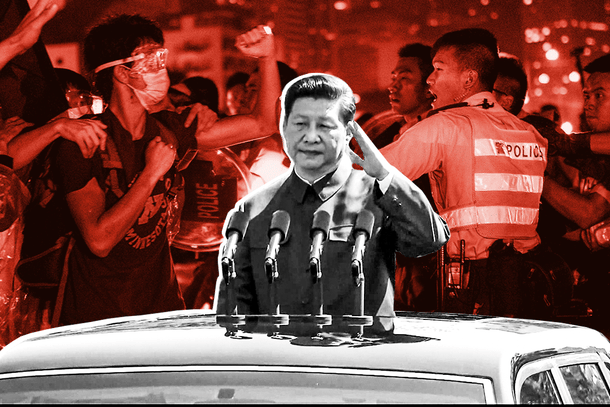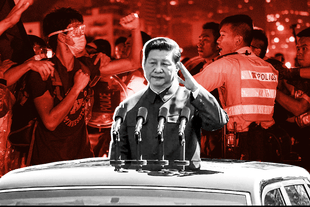World
As The World Battles Covid-19, China Is Quietly Tightening Grip On Hong Kong
Tushar Gupta
Apr 20, 2020, 05:01 PM | Updated 05:01 PM IST
Save & read from anywhere!
Bookmark stories for easy access on any device or the Swarajya app.


Before an artificial recession ushered by the coronavirus (Covid-19) outbreak engulfed the global economy, the world’s attention was fixated on two main issues with respect to China — its trade war with the United States and the protests in Hong Kong.
While the trade war was overshadowed by a recession that pushed the global economy off the edge, the Hong Kong protests lost traction in the Western media as the West became the epicentre of the outbreak.
The protests stemmed from the controversial extradition bill. The critical issue with the bill was that it would have allowed Hong Kong to extradite any ‘suspected’ criminals to mainland China — ruled by the Communist Party of China (CPC), thus preventing dissenters from the mainland from taking refuge in the city.
As per the initial draft, the legislation would have allowed for business owners, religious leaders, political dissenters, and anyone suspected of any crime against the Chinese government to be extradited to the mainland.
Given the prevailing dictatorial policies of the CPC in the mainland, the opaqueness of the judicial system, the constant abuse of human rights, and state-enabled media censorship, this legislation was seen by the citizens of Hong Kong as a free ticket for Beijing to suppress the rights and erode the autonomy they were promised during the handover in 1997.
In early September last year, the bill was formally withdrawn.
However, the protests continued as activists demanded an independent investigation into alleged police brutality, voting rights for all citizens of the city, dropping of charges against pro-democracy protesters, and for the protests to not be classified as riots, even though they caused the Hong Kong airport to be shut for a few days, as that would have amounted to a prison term of 10-years for the protesters.
By the end of 2019, the protests were already on the wane but what broke their momentum was the outbreak of Covid-19. The first case was reported in late January 2020. However, due to early measures by the local government, the city has only reported a little more than 1,000 cases so far.
Earlier this weekend, China began flexing its muscle within the city, embarking on an arresting spree. On Saturday, 15 people were arrested by the Hong Kong government which is backed by the CPC through an intricate political understanding. The ones arrested include pro-democracy activists and lawmakers. As per the local police, more arrests are under consideration for unauthorised assemblies last year.
After China’s Liaison Office, which represents Beijing’s interests in the city, asserted its right to interfere in the domestic affairs, the local authorities had to put a series of clarifications, highlighting the limitations of the office. However, they were rejected by the Liaison Office.
Beijing’s interference has not been restricted to protests alone.
Earlier this month, the Hong Kong and Macau Affairs Office, a top agency responsible for the operations in the city, ordered the city’s Legislative Council to end the stalemate and go back to normal operations.
Lately, the members of the opposition have paralysed the election of the chairman to the House Committee, thus hindering crucial operations of the city legislative council.
The House Committee is responsible for scrutinising bills before they are voted upon. Beijing government-backed office called it a serious violation of oath on the part of the legislators.
Following this statement from Beijing top’s agency, Priscilla Leung Mei-fun, a legislator inclined towards China stated if the deadlock within the legislative council continued, it could threaten the ‘one country, two systems’ setup under which Hong Kong is governed.
The ‘one country, two systems’ rule came into being after the British handover of Hong Kong to China in 1997. The system, to be in place, until 2047, allows Hong Kong a ‘mini-constitution’ to preserve its freedoms that it inherited culturally from the British.
These include the freedom of press, speech and assembly, the same freedoms that are not allowed in the Chinese mainland. The Beijing government, as per the agreement, has control only over the defence and foreign policy of Hong Kong.
The arrests over the weekend drew criticism from the governments of the United States and the United Kingdom.
However, the spokesperson of the Commissioner’s Office of the Chinese Foreign Ministry in Hong Kong retaliated by stating that the US and UK must stop meddling in Hong Kong’s internal affairs, describing the arrests as a domestic issue.
The office further attacked the UK Foreign Office for describing "unauthorised assemblies" as "peaceful protests", and stated that it was an attempt to whitewash anti-China troublemakers in the city.
Another statement was issued from the office of the Foreign Ministry attacking the US. The statement said that the politicians in the US were making a travesty of the rule of law by ignoring facts, distorting the Sino-British Joint Declaration, and trying to shift the blame away from violent protesters in Hong Kong.
The attempt of the mainland government to further annex Hong Kong has roots in the city’s reducing economic clout, going from being a quarter of China’s gross domestic product (GDP) in 1993 to a little more than 3 per cent today.
Even before the protests, the Chinese had been undertaking steps to further erode Hong Kong’s cultural and economic freedom. For instance, Mandarin, as a language, is now being given preference over Cantonese and English.
The Hong Kong-Zhuhai-Macau Bridge, the longest sea-crossing in the world, connects Hong Kong, Zhuhai and Macau, cutting down the road distance between these three major commercial cities to mere 30 minutes, and further demonstrating China’s ambition of economic integration of the city with the mainland.
The double whammy, that of the protests and the slowdown due to Covid-19, has the Beijing government pushing for political stability in the city which is also now desired by the local residents to ensure an economic recovery at the earliest.
Thus, in this scenario, there is little hope for the pro-democracy protesters in the city. For the future, an economic recovery may well be on the cards for Hong Kong. Political freedom, however, not so much.
Tushar is a senior-sub-editor at Swarajya. He tweets at @Tushar15_




